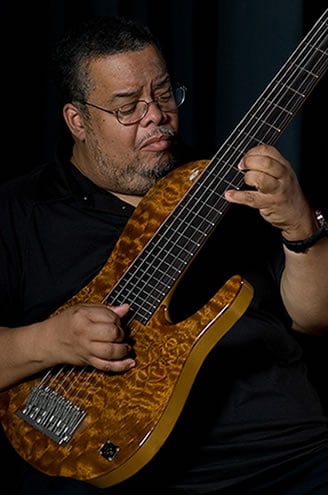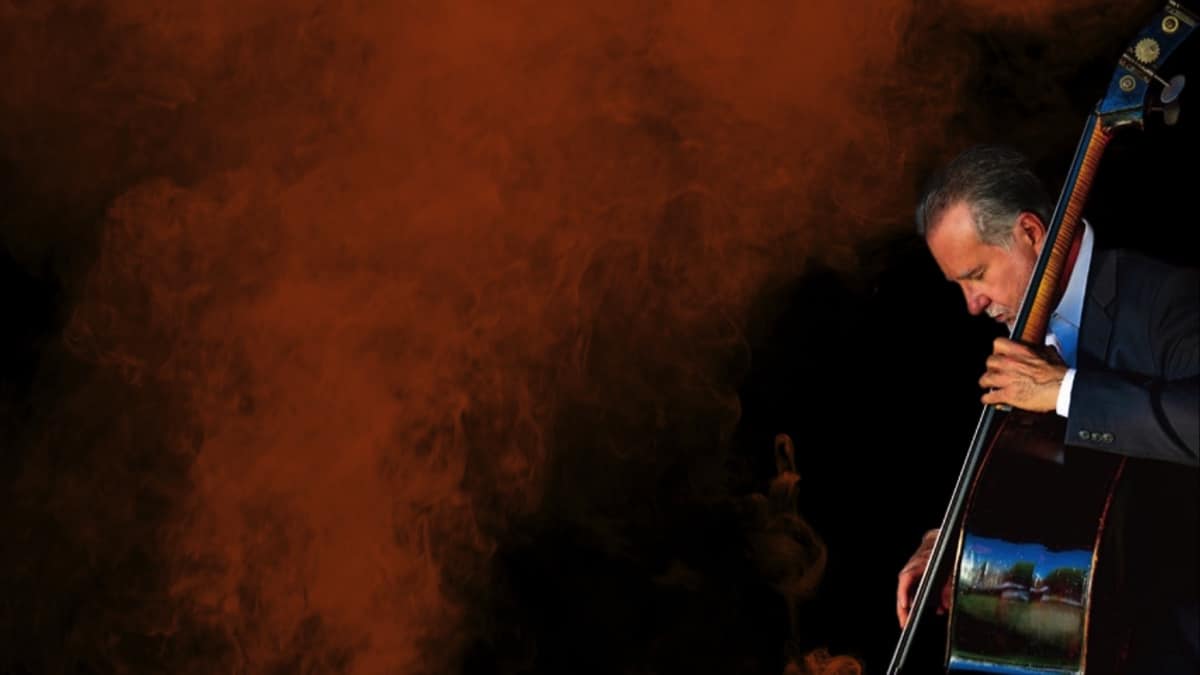Cover
Bass Musician Magazine: Apr/May 2009 Issue Featuring Anthony Jackson

Certainly one of the gifts that most of us miss is starting early enough, and intensively enough to build a set of preferences and choose to be inspired so that when you run into close mindedness and bigotry in the arts, and artistic taste, you’re immune to it. No one should be able to make you feel bad and tell you, stop playing that crap, play this instead.
So we are kind of back to what we spoke of earlier, how do we change things, how do we change attitudes. I have to approach it the way I grew up. Is it magic, does it make you want a cry with joy, does it get your heart racing… that’s what it’s about. And what if it’s something you think you don’t like… you give it a chance, and if you like it, you play it. Eventually, there’s nothing you don’t like. When people ask me, what’s your favorite kind of music, I have a stock answer. I say, “Good” music. And they’ll say, ha-ha-ha, you’re trying to be funny, what’s the music you “really” like to play? And I’ll tell them, I don’t care, as long as it’s good. Well, who should decide if it’s good? Well, who did you ask……..? You asked me. If I think it’s good, I’m speaking for myself. Again, who am I supposed to be speaking for? You asked me what my favorite music is. Am I supposed to tell you what somebody else told me? Is my favorite music what I’ve been told to be my favorite music? Of course not! Just listen, and make it good… good writing, good playing, and let’s all sit down and spill our blood on the floor and make it come to life. I don’t care what it is.
That’s a point that I think needs to be considered much more these days. There’s nothing we can do to change the music scene. All we can do is be individuals. You as an individual voice should hold the standard high. You want to have it set up so whenever people think of you, they’ll say oh; this is going to be great. You can’t be responsible for what anyone else likes, or does. You just need to be responsible for what you do, and eventually it spreads. Other people begin to share that same principle. You shouldn’t be able to tell when someone is playing what their specialty is. You don’t want to be caught in this scenario: OK; we want Jake for this project. Well, what’s he do? Oh, he plays “this’ kind of stuff. No, I’m looking for someone that plays “this” kind of stuff. Again, you don’t want to be considered a specialist. If it’s for the bass guitar—you call me! That’s it. I defy anyone to tell me what my specialty is. Not because I’ve worked at hiding that, it’s because I don’t have a specialty. I just want to hear great music, and I want to play great music. And my archetype again was Steve Gadd. Plays with Chick Corea, brilliantly, and then plays behind Donna Summer playing disco, once again, brilliantly. You can’t say, this is a jazz guy, or this is a pop guy. That’s really what I wanted to be. I never wanted people to say, Anthony’s probably not your guy for this track, let’s call Eddie Gomez. I need to state that Eddie is a good friend of mine, and I respect him to death, but unless you’re in love with having an upright player, don’t replace me. Why would you… because I’m a pop player? And why am I a “pop” player, because I play on sessions? With keeping the kind of an attitude I spoke of, I believe the tide can be turned away from the shallowness of music that’s happening now. Sometimes I believe it can’t, but actually, I think it will.
Jake: I had a final question, but it seems to me that it might be a bit redundant with all that we’ve encompassed already within this interview.
Anthony: Please, go ahead.
Jake: Well, not that we haven’t touched on this, in great depth I might add, but here it is. What would have to evolve in terms of the industry to get us back to a point where we could possibly envision the potential of the “art” of a project actually being the “main” ingredient for its success?
Bass Videos
Brian Bromberg, Paying Tribute to Scott LaFaro – April 2024

Brian Bromberg, Paying Tribute to Scott LaFaro, April 2024…

Brian Bromberg is one heavy-hitting bass player and I am in awe of his talent as one of the few individuals who is equally proficient on electric and upright bass.
You might remember our conversation back in 2018 when he released his powerhouse Funk album. Brian’s “A Little Driving Music” album is a staple on all our road trips and his Jaco and Jimi Hendrix tribute albums are mind-blowing… and I could go on and on.
Now, Brian has taken on the arduous task of producing an album paying tribute to the late, great, Scott LaFaro. He teamed up with pianist Tom Zink and drummer Charles Ruggiero and Brian delivers a commanding performance on upright. The entire album is a masterpiece and a real treat to listen to track after track.
Join us as Brian shares the details behind this project and more.
Photo, Michel Bocandé
Featured Videos
Visit Online
brianbromberg.net
FB @BrianBrombergBassist
YouTube
Cover
Leland Sklar, Over Half a Century of Bass, March 2024

We all have enjoyed Leland Sklar’s Bass lines for over half a century.

You might remember that we had him on our cover back in 2017 and did an update when he launched his book “Everybody Loves Me” in 2020. It was exciting to hear that The Immediate Family had got back together in the studio to work on their own music in 2019 and are now up to two albums.
Just last December, Magnolia Pictures released a documentary titled “Immediate Family” where we got a behind-the-scenes look at the massive contributions Danny Kortchmar, Waddy Wachtel, Ross Kunckle, Leland Sklar and Steve Postell have made in countless songs that are the very essence of our daily personal musical soundtracks. Seeing the astronomical roster of performers they have supported over many years is very eye-opening. It is a must-see for any music lover!
Now, I am thrilled to bring you a special chat with Leland Sklar where we go more in-depth into the bass side of his musical journey.
Photos: Header, Rob Shanahan – Cover Photo, Jay Gilbert/Chris Schmitt
Featured Videos:
Skin In the Game – https://www.youtube.com/watch?v=QhbnzIrdjJ8
from new album Skin In The Game
The Toughest Girl In Town – https://www.youtube.com/watch?v=UVQLZIRfLjU
from new album Skin In The Game
Fair Warning – https://www.youtube.com/watch?v=1DN18DYwLsU –
from the self-titled album The Immediate Family
Visit Online
www.immediatefamilyband.com/
www.facebook.com/TheImmedFamily
www.instagram.com/theimmedfamily/
Bass Videos
Ricky Phillips, STYX Bass And More – February 2024

Ricky Phillips, STYX Bass And More…

I have always been a huge Styx fan. Their music kept me awake during countless nights studying and gave my imagination a place to escape when I had a moment to take a break.
I had the immense opportunity to chat with STYX bassist Ricky Phillips for our August Cover in 2017 and follow his projects as time passed. Now, I am thrilled to have the opportunity to catch up with Ricky as he has been super-busy over the past six years.
Join me as we take a deep dive into the band’s most recent album “Crash the Crown” and EP “The Same Stardust”. Ricky shares some insights into the herculean team effort behind the scenes and the musical process that keeps them ever so busy and how he has updated his sound.
Without further ado… Here is Ricky Phillips!
Photo: Jason Powell
Featured Videos:
“Crash of the Crown” lyric video
“Reveries” lyric video
“Save Us From Ourselves” lyric video
“Sound the Alarm” lyric video
“Too Much Time On My Hands” Zoom video 2020
Visit online:
www.Styxworld.com
FB & IG @styxtheband
Bass Videos
Jeff Pilson, Foreigner Low End – January 2024

Jeff Pilson, Foreigner Low End – January 2024…

Those of us who were around back in the 70’s remember how certain songs on the radio resonated with us. It turns out that many of these iconic melodies came from Foreigner and they were part of our personal soundtracks!
After all these years, the band is going as strong as ever with Jeff Pilson firing away on bass midstream into a 2-year farewell tour.
I am excited to be able to bring you all the details about Jeff’s musical Journey, the farewell tour in progress, how he gets his sound and his plans for the future.
Cover Photo: Krishta Abruzziini / Video Photos: Krishta Abruzzini, Karsten Staiger, Gina Hyams
Featured Videos
For more news on FOREIGNER and upcoming Farewell Tour dates, fans can visit:
foreigneronline.com
facebook.com/Foreigner
twitter.com/ForeignerMusic
instagram.com/foreignerlive
youtube.com/user/FWebTeam
Also on FB @officialjeffpilson
Bass Videos
Rodney O’Quinn, Rockin’ Hard Through the Years – December 2023

Interview With Foghat Bassist Rodney O’Quinn…

Many rock fans have enjoyed music by Foghat, who originally formed in London back in 1971.
Over the many decades of playing, the band members have changed, leaving behind only Roger Earl as the only original member. Bassist Rodney O’Quinn left the Pat Travers Band and joined the group in 2015 and has been laying down the low end for this iconic quartet keeping the Foghat legacy alive. With a new album titled “Sonic Mojo” which dropped on November 10th, the band is as busy as ever and there is lots of very tasty music to come.
Join me as we learn of Rodney O’Quinn’s musical journey, how he gets his sound, and his plans for the future.
Photos:
Cover, Jake Coughlin
Video Thumbnail, Tom Apathy
Photos used in the video: Kerry Quinn, Chuck Lanza, Kim Granger, Kenneth Strohm, Jake Coughlin, Jay Jylika
Featured Videos:
1st Single from Sonic Mojo – Official “Drivin’ On”
2nd Single from Sonic Mojo – “She’s a Little Bit of Everything Official Video
“Road Fever”- California Mid State Fair – Paso Robles, CA – 7-27-22
“Stone Blue” – Rodney O’Quinn Bass/Lead Vocals – Don Odell’s Legends – Woonsocket, R.I – 10/15/22 – The Stadium Theater
The Earl’s Court – Season 2, Episode 7: Funny Guys
“I Just Want to Make Love to You” – CasinoRama – 6-9-23
FOGHAT “Somebody’s Been Sleepin’ in My Bed” – Mohegan Sun, Uncasville, CT – 1/28/22
“I Just Want to Make Love to You” – California Mid State Fair – Paso Robles, CA – 7-27-22
Visit Online:
www.foghat.com
www.facebook.com/Foghat
www.twitter.com/FOGHAT
www.instagram.com/foghat_official
www.youtube.com/user/FOGHATMUSIC


















